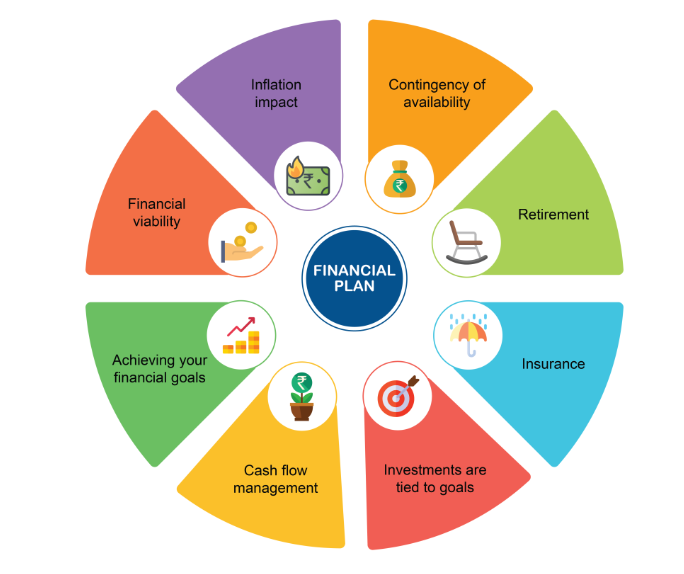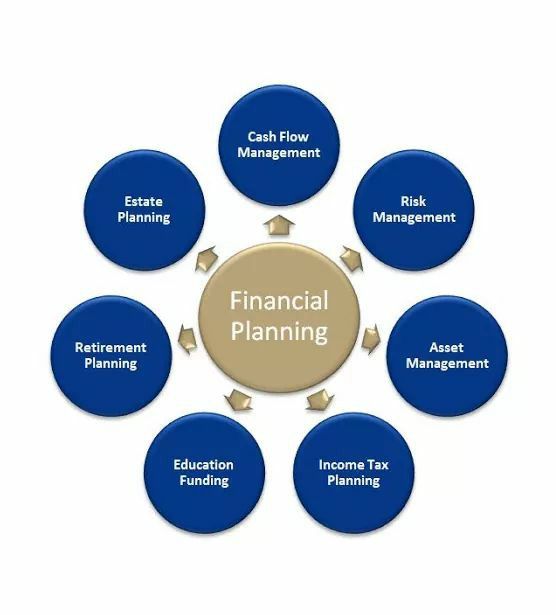Financial Planning
What Is a Financial Plan?
A financial plan is a document that details a person’s current financial circumstances, their short- and long-term monetary goals, and the strategies to achieve those goals.
A financial plan can help you to establish and plan for fundamental needs, such as managing life's risks (e.g., those involving health or disability), income and spending, and debt reduction.
It can provide financial guidance so that you're prepared to meet your obligations and objectives. It can also help you track your progress throughout the years toward financial well-being.
Financial planning involves a thorough evaluation of one’s money situation (income, spending, debt, and saving) and expectations for the future. It can be created independently or with the help of a certified financial planner.

Key Takeaways
- A financial plan documents an individual’s short- and long-term financial goals and includes a strategy to achieve them.
- The plan should be comprehensive and highly customized.
- It should reflect an individual’s personal and family financial needs, investment risk tolerance, and plan for saving and investing.
- Planning in finance starts with a calculation of one’s current net worth and cash flow.
- A solid financial plan provides guidance over time and serves as a way to track progress toward your goals.
Why Do You need to have a Financial Plan?

1. Inflation Impact :
- When your mother goes grocery shopping and comes back, I am sure you must have heard her saying. I bought rice today at Rs. 50 per kg, I used to buy the same rice at Rs. 10 per kg when you kids were younger. This is inflation. Steady increase in the prices of goods and services.
- As the prices of these goods and services increase, so does the cost of our future goals. If today it costs Rs. 25 Lakhs for higher education abroad, it would cost Rs. 73.4 Lakhs when your kid grows up after 16 yrs, if inflation is at 7%. Inflation has a compounding effect.
2.Contingency fund availability :
- You may never know when the job scenario turns gloomy or the yearly hikes are not in line with the prevailing inflation. Therefore, contingency planning becomes very important for such scenarios.
- With elderly parents in house and unexpected medical instances on the rise, it calls for keeping contingency fund ready for such situations. Financial planning helps you take into account not just your long term goals but even your short term needs. A thumb rule suggests keeping 6 months salary in highly liquid form for this need.
3. Retirement :
- Like our parent’s generation, we will not be supported by any pension structure and so planning for the retire life is a crucial aspect. With life expectancy on the rise, it becomes all the more important to plan your retirement.
- For example, a 35 year old would need a retirement corpus of Rs. 4 Crores, if his/her monthly expenses are of Rs. 50,000 today; wishing to retire at the age of 60 years, with life expectancy of 85 years.
4. Insurances :
- Having a financial plan helps you prepare for risks. Risks are unforeseen events that can cause financial distress. The worst-case contingency is an untimely death, which can result in financial distress for the family, apart from the emotional trauma.
- Financial planning can help us prepare for such contingencies through adequate life insurance. Another contingency is serious illness that can have an impact on your savings and consequently your short term or long term financial objectives. A good financial plan will make adequate provisions for health insurance.
5. Investments are tied to goals :
- Since any money decision impacts your financial planning, you must keep your money decisions in line with the financial plan like decisions on tax planning, insurances, etc.
- This also keeps you away from making any ad hoc investments and from inefficient tax planning.
6. Cash Flow Management :
- Financial planning helps you manage your inflows and outflows in a way that you utilize your resources in the best way, in order to achieve your goals.
- It helps you in cutting-out unnecessary expenses and gives a strong hold over your financial situation.
7. Achieving your Financial Goals :
- You can achieve your goals comfortably if you start early and can have a solid plan to meet your goals.
- However, it is never too late to start planing towards and for the achievement of your financial goals, which may help you in gathering up and prioritizing your goals and working towards achieving them.
8. Financial Viability :
We often have these questions in mind–
- Can I upgrade my car?
- Can I donate more?
- Can I upgrade my home?
- Can I go for Premium holiday package?
All these questions can be easily answered with a sound Financial Plan
Benefits of Making a Financial Plan
- A financial plan involves a thorough examination of your income and spending.
- It can improve your understanding of your financial circumstances at all times.
- It establishes important short- and long-term financial goals.
- It clarifies the actions required of you to achieve your various financial goals.
- A financial plan can focus your attention on important immediate steps, such as reducing debt and building your savings for emergencies.
- It enhances the probability that you'll achieve financial milestones and overall financial success (however you define it).
- It can guide your efforts over time and provide a means to monitor your progress.
- It can keep you out of financial trouble and reduce the stress and worry you may have experienced in the past.
What Are the 7 Key Areas of Financial Planning?

Why is Financial Planning Important?
A financial business plan has two main purposes. A business needs a financial plan that proves the business will grow, scale, and provide shareholder value over the long term.. Ensuring growth, scale and consistent shareholder value is vital to all stakeholders in the business. . Similarly, the financial plan proves to lenders and banks that the business will be able to repay any loans.
Just as critically, though, a financial forecast benefits leadership. A realistic projection of how the business is likely to perform prepares management and staff. A financial plan is a guide to running a healthy business and should be considered a living document.
There are several other reasons why financial planning is important to a business:
Credibility
Be realistic when developing a financial business plan, make sure your forecast or plan mirrors business reality. However, if you can demonstrate that your financial plan is realistic in a step-by-step way, your financial forecast will be credible. For example, if you break down your figures into components or channels to provide more detailed estimates, you may be able to reassure lenders, investors, and leadership more.
Balancing the balance sheet
Balance sheet optimization is one of the powerful benefits of financial planning. Identifying and assessing all business assets and liabilities and planning in advance how and when to pay all taxes, salaries, expenses, overheads, and miscellaneous costs is part of this process. Another strategy is to divide the business into functions or departments and prioritize them to better identify which important and urgent investment areas.
Long-term visibility
Efficient, comprehensive financial planning gives businesses improved long-term visibility into fund allocation. Analysis of how funds are deployed within a business can positively affect productivity and revenue and offer deeper insight into the health of the business. This kind of visibility also empowers more insightful decision making.
Strategic marketing
No business has endless money to burn on marketing, and a well-designed financial plan helps identify which marketing strategies are most productive for that particular business. Business marketing strategies frame tasks for a company, from planning to execution and implementation.
The marketing team may well be experts across the board when it comes to marketing channels and strategies. However, only actions that generate more business in measurable ways should be planned for the company. Ultimately, finance partnership with the business assesses whether the metrics in the reports justify ongoing marketing campaigns, so for every strategy the team formulates for business, they should highlight the ratio of expense and profits.
Monitoring assets (In’s) and liabilities(Out’s)
The financial team protects the stability of the business by routinely monitoring its assets and liabilities and the ratio of liabilities and assets. This ongoing activity provides insight into needed improvements and actionable ways to decrease liabilities and increase assets.
Measuring profit and loss
The finance team compiles financial planning reports to support evaluation of organizational profits and loss. These reports also showcase the net profits and their main causes, assisting management in evaluating which strategies worked best for the business.

The Bottom Line
A financial plan is an essential planning tool for your financial well-being, now and into the future. It involves setting down the current state of your finances, your various financial goals, and methods that can help you achieve them.
It's never too early or too late to create a financial plan. And no matter the amount of money that you have, a financial plan can help you to determine the best way to put it to work so that you can meet your financial needs through all of your life stages.
